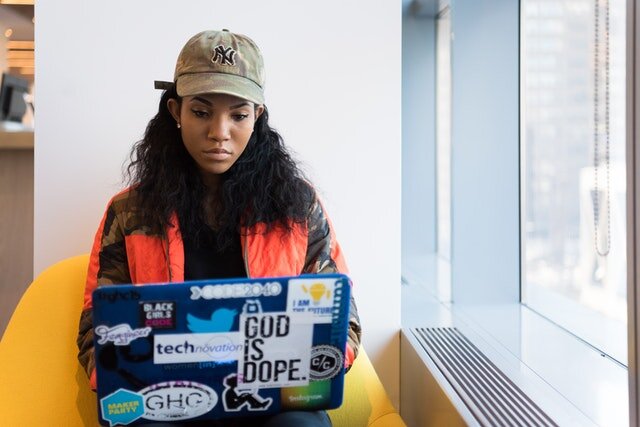Written by Anna Almore
Check-in on your beloved colleagues and teachers— we are not okay. The educators of Profound Ladies, an organization designed to recruit and retain Black, Indigenous and women of color teachers, have much to teach us about how teachers are experiencing the pandemic. As part of honoring Black History Month, we need to talk about the vicarious trauma Black women teachers are living through as the pandemic continues to ravage and haunt our communities.
Some of our Profound Ladies are first generation college students which means that they are the first ones in their family to have a career like teaching. They can be seen as a provider and are oftentimes a resource, a go-to, a material supplier if anyone in the family needs additional money, resources, or support. During this time, we are already stretched thin. Our teachers who are providers are not given a working wage for the essential work that they do; they’re our frontline workers and deserve to be compensated for it. As they enter a school building to do the work they love, they’re increasing their risk of transmitting COVID to their families— populations that are already high risk.
On top of many carrying the additional burden of being their family’s primary financial support, we now provide for families who are disproportionately facing evictions, contending with food insecurity, and barriers to childcare. So many of our Black teachers are carrying these invisible burdens and more. Many of us were taught to “keep your business in your own house,” meaning that we keep our concerns, our challenges, and our needs to ourselves. Too often, this is accompanied by the internalization of what is popularly called “Black Girl Magic.” Unfortunately, the insidious shadow effect of Black Girl Magic is costly: we may not be able to save the world, but we die trying. We all know about the unpaid emotional labor and invisible work women are constantly asked to do. This compounds when we layer on racialization and the pernicious trauma that accompanies it.
We carry the weight of our community. Make things happen. Juggle 10 things. We’ll make it look easy, but the cost is high. We pay for it with our mental health and the physical manifestations of inherited and relentless stress including increased blood pressure, increased risk of stroke, heart disease, and some kinds of cancer, increased anxiety, sleeplessness, and chronic fatigue. The emotional calculus of code switching linguistically and behaviorally when navigating institutions that were not made for us and conspire for our failure takes an emotional, physical, and spiritual toll on us.
There has not always been an educational space that holds Black women teachers’ vulnerability and humanity with the grace and capacious we deserve— a space where she would say, “I am struggling.” Therefore, sometimes Black teachers don’t have everything that they want and need because we are too busy advocating for everybody else. It is who we are as nurturers and givers. Our nurturing built this nation from the ground up. The bodies of our ancestors and our labor today is the reason why the American economy is so strong and the unpaid debt of this sacrifice has compounded interest through modern day exploitation of our physical and emotional labor.
If we treated Black women teacher’s labor with care and respect, how would our communities’ ancestral strengths shine brighter? How would schools be structured around family needs and aspirations? How would our visions of success transform? More urgently, in light of the pandemic, how many evictions of Black families would there be or how many homes would still struggle with food insecurity?
The Combahee River Collective said, “If Black women were free, it would mean that everyone else would have to be free since our freedom would necessitate the destruction of all the systems of oppression” (Combahee River Collective 15). In other words, when Black women succeed, all can succeed. Profound Ladies honors this tradition in two ways. First, Profound Ladies unquestionably believes that BIPOC women teachers are tonics to educations’ most pressing issues and provide profound impact to all students. Secondly, and just as important, they are deserving of reparative, healing, equitable support that they have been historically denied.
When we invest in Black women teachers in our communities, everyone in that community benefits. This is at the heart of Profound Ladies timely intervention in the education ecosystem. Bring Profound Ladies to your school or join by visiting our website www.profoundladies.org.
The Combahee River Collective Statement : Black Feminist Organizing in the Seventies and Eighties. 1st ed., Kitchen Table: Women of Color Press, 1986.

